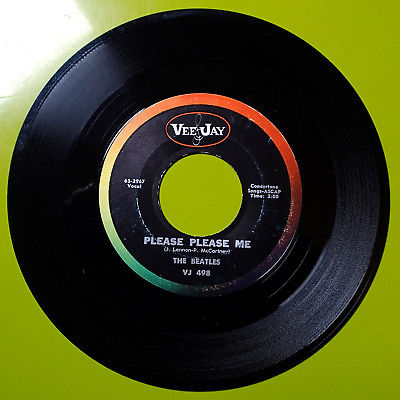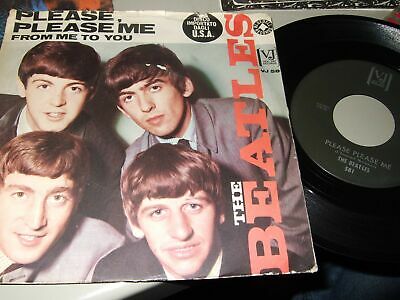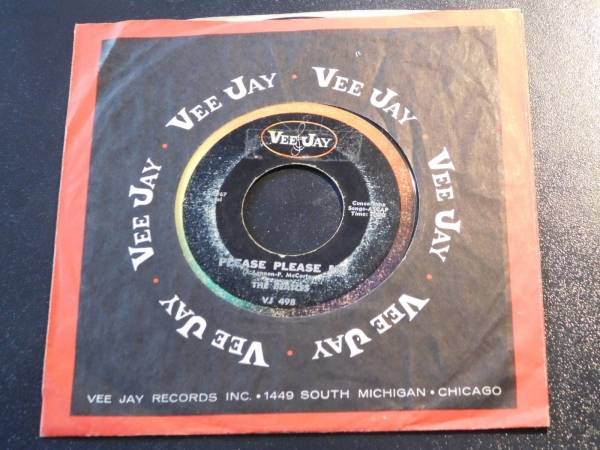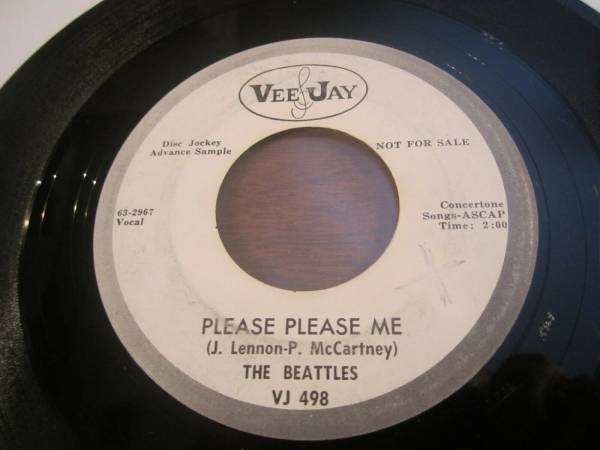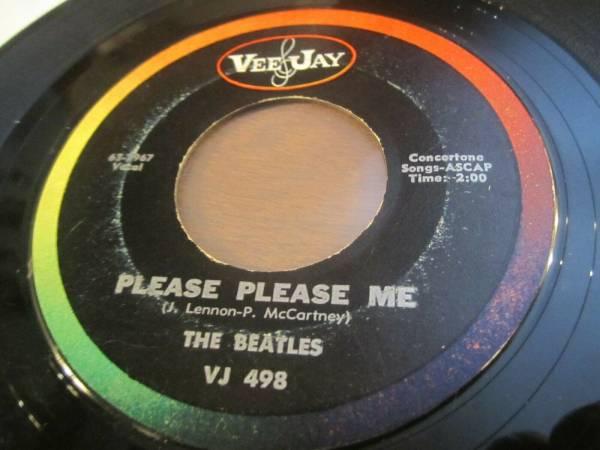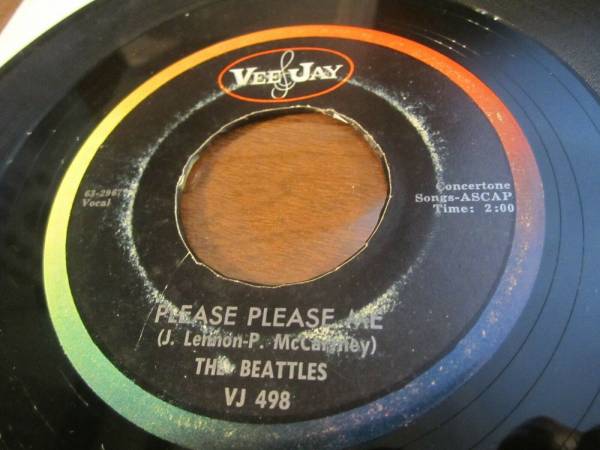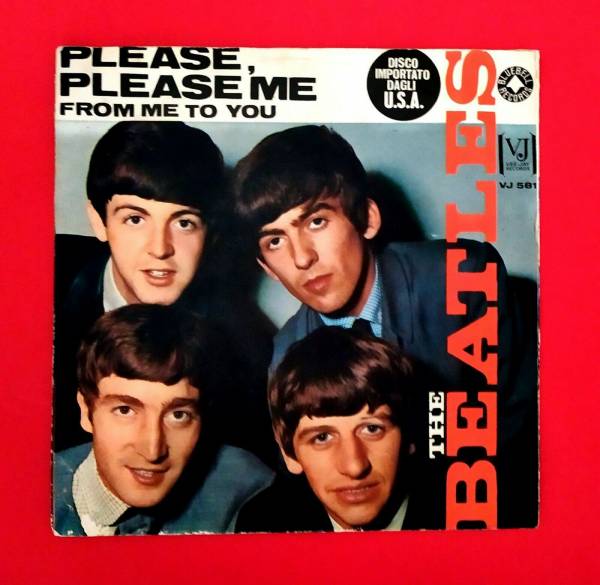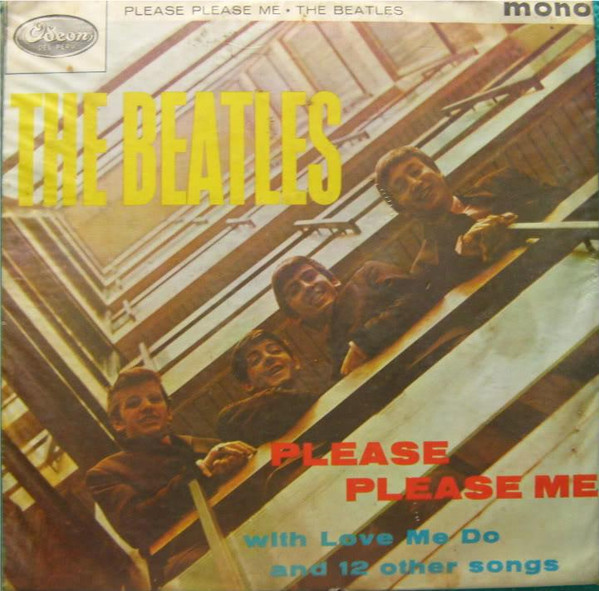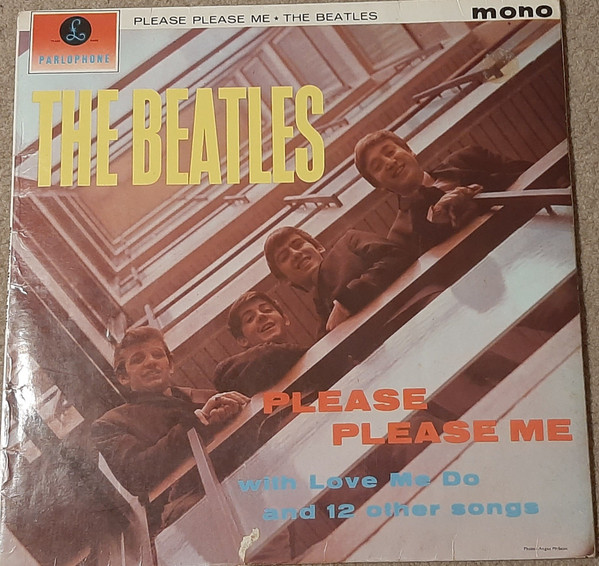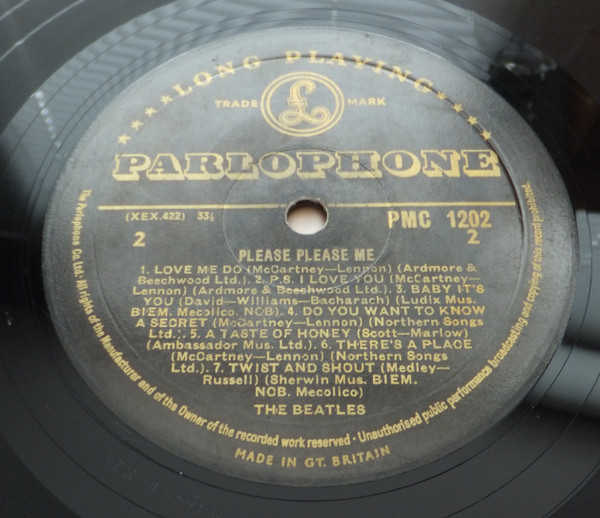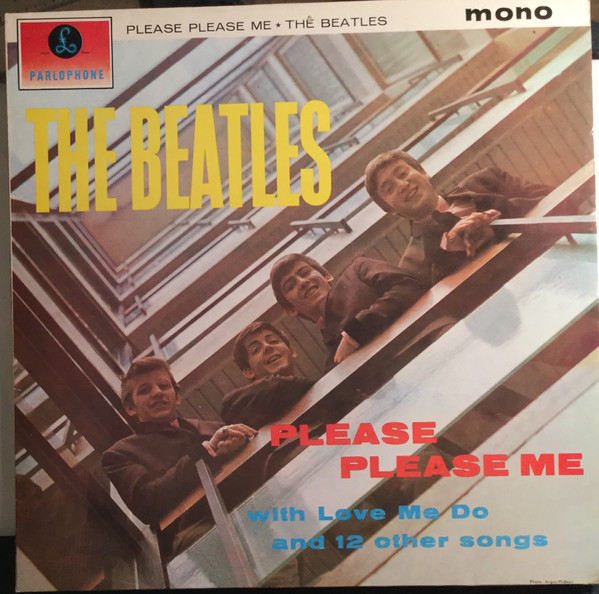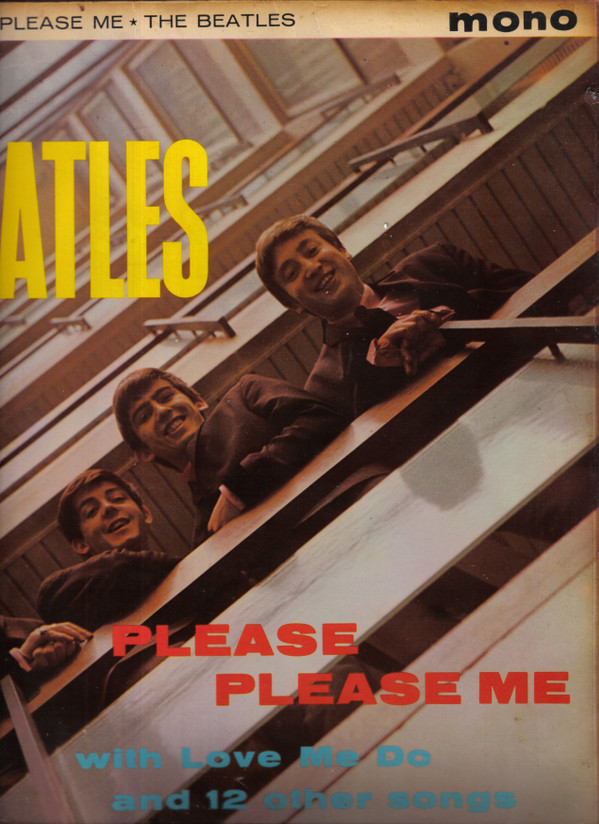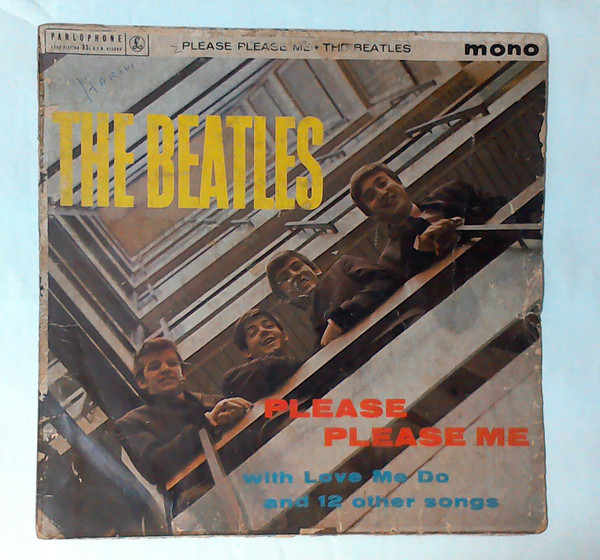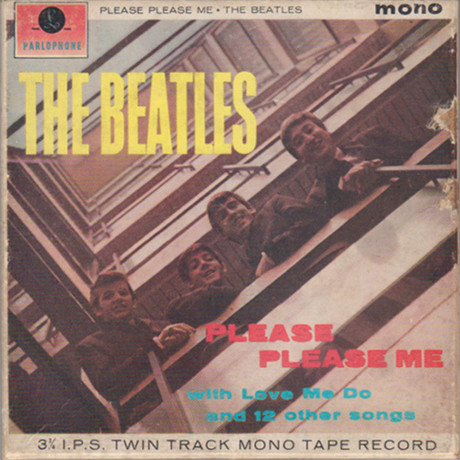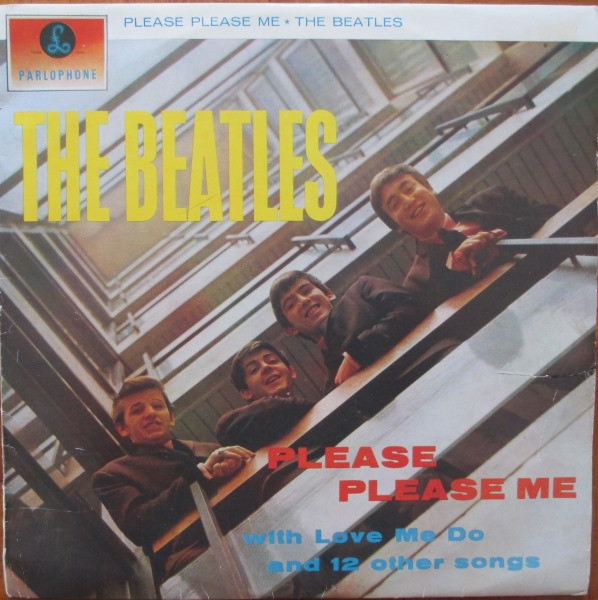Item Description
WE CURRENTLY HAVE MORE THAN 200 LISTED ITEMS Click here to see ALL our ROCK auctions Our PSYCH PROGRESSIVE auctions Our PUNK NEW WAVE auctions Our JAZZ auctions Our BLUE NOTE JAZZ auctions Our BLUES auctions Our CLASSICAL auctions Our COUNTRY auctions Our FUNK auctions Our LATIN auctions Our METAL auctionsOur REGGAE auctions Our SOUL auctions Our STILL SEALED ITEMS Our PROMO auctions Our ACETATE auctions Our TEST PRESSING auctions Our AUDIOPHILE auctions THE BEATLES PLEASE, PLEASE ME c/w ASK ME WHY INSANELY RARE ORIGINAL 1963 VEE JAY RECORDS MONO 45 rpm 7-INCH SINGLE 498 ORIGINAL U.S.
PRESSING INSANELY RARE ORIGINAL FEBRUARY 1963 VEE JAY PRESSING - BY FAR THE RAREST U.S.
BEATLES SINGLE AND HISTORICALLY THE VERY FIRST TIME THE BEATLES WERE CREDITED IN THE UNITED STATES UNDER THEIR FULL AND PROPER NAME THERE WERE PREVIOUS BEATLES RELEASES IN THE UNITED STATES, BUT NEVER UNDER THE NAME OF THE BEATLES WE PROUDLY PRESENT ONE OF THE FINEST AND BEST PRESERVED COPIES EXTANT NOT QUITE NEAR MINT, BUT VERY CLOSE ORIGINAL BLACK VEE JAY LABEL WITH MULTICOLORED SPECTRUM RAINBOW BAND ALONG THE LABEL S EDGE AND OVAL VERSION OF THE LABEL VEE JAY LOGO IS ENCIRCLED BY A WHITE OVAL LINE VERY RARE WEST COAST PRESSING MONARCH PRESSING PLANT, LOS ANGELES SO RARE IS THIS SINGLE THAT EVEN A MERE MENTION OF VEE JAY 498 IS ENOUGH TO TRIGGER EPISODES OF MASS SALIVATION AND DROOLING ON PART OF THE BEATLES COLLECTORS.
EVEN THE MOST SEASONED BEATLES COLLECTORS LIVE AND DIE WITHOUT EVER SEEING ONE OF THESE, LET ALONE HOLDING OR OWNING ONE OF THESE MYTHICAL PIECES THE SINGLE WAS RELEASED A WHOLE YEAR BEFORE THE BEATLEMANIA HAD HIT THE UNITED STATES AND JUST AS IT WAS ABOUT TO ENGULF THE UNITED KINGDOM VEE JAY NEVER SERIOUSLY PROMOTED THE SINGLE AND IT WAS PRINTED IN MINUSCULE QUANTITIES, SINKING WITHOUT A TRACE UNTIL ABOUT A YEAR LATER THE INITIAL RELEASE NEVER CHARTED PLEASE, PLEASE ME WAS RE-RELEASED ON VEE-JAY SINGLE AGAIN IN EARLY 1964, THIS TIME WITH A DIFFERENT, CHART-BUSTING B-SIDE FROM ME TO YOU AND WITH THE PICTURE SLEEVE, WHEN THE INITIAL WAVE OF BEATLEMANIA WAS IN FULL SWING SADLY, BY THAT TIME, VEE JAY HAS MISSED THE BUS: THEY HAD ALREADY LOST LEGAL RIGHTS TO THE BEATLES MATERIAL TO CAPITOL RECORDS THIS IS A MUCH RARER FIRST FEBRUARY 1963 RELEASE OF THE SINGLE, WITH ASK ME WHY ON SIDE B..
THIS IS THE ORIGINAL, AUTHENTIC, FIRST U.S.
PRESSING THIS IS NOT A REISSUE, AN IMPORT, OR A COUNTERFEIT PRESSING.
THIS IS THE VERSION WITH THE CORRECTLY SPELLED BEATLES NAME THE BEATLES, NOT THE BEATTLES THIS IS THE VERSION WITHOUT SIGN BEFORE THE CATALOG NUMBER VJ 498, NOT 498 THE RECORD HAS AUDIOMATRIX STAMP IN THE TRAIL-OFF VINYL DEAD WAX AREA, WHICH IS GENERALLY CONSIDERED A PROOF OF AUTHENTICITY OF THE FIRST PRESSING.
MINOR RING WEAR NOTED ON THE LABELS.
HAND ETCHED MATRICES IN THE TRAIL-OFF VINYL IDENTIFY THIS SINGLE AS THE ORIGINAL 1963 RELEASE: 63-2967 SIDE 1 AND 63-2968 SIDE 2 THE RECORD COMES WITH THE RARELY SEEN ORIGINAL, HISTORICALLY ACCURATE, AUTHENTIC VEE JAY STOCK SLEEVE NOT SEPARATELY GRADED BUT IN GREAT CONDITION OVERALL PLEASE SEE THE IMAGE OF THE COVER, LABEL OR BOTH, SHOWN BELOW Note: this is a REAL image of the ACTUAL item you are bidding on.
This is NOT a recycled image from our previous auction.
What you see is what you ll get.
GUARANTEED VJ 498, Please Please Me: Released February 7, 1963 This is THE FIRST U.S.
Beatles 45, unless you count the U.S.
Decca Tony Sheridan and The Beat Brothers from 1962.
This VJ release, considered a Holy Grail item for Beatles 45 collectors and 45 collectors in general, was released almost one year before Capitol Records finally decided The Beatles were worth taking a shot on and released I Want To Hold Your Hand.
Stock copy variations of this release include: Oval or brackets logo.
2 T s in Beatles or one.
Thick print for title or thin.
This copy is the Oval logo Stock, with Beatles spelled correctly.
Thick print please see the pictures if you have questions .
VJ pressed very few of these and didn t promote the record.
Therefore Please Please Me stiffed until VJ re-released the song in early 1964 with a different number and B-Side once Capitol s release of I Want To Hold Your Hand proved to be a hit.
Please Please Me as VJ 581 became a top five hit in April of 1964 when The Beatles held the top five positions on the Billboard Singles Chart.
Label variations of records usually have to do with the pressing plant of origin.
Please Please Me is a song and the second single released by the Beatles in the United Kingdom, and the first to be issued in the United States.
It was also the title track of their first LP, which was recorded to capitalise on the success of the single.
It was originally a John Lennon composition credited to Lennon McCartney , although its ultimate form was significantly influenced by George Martin.
John Lennon: Please Please Me is my song completely.
It was my attempt at writing a Roy Orbison song, would you believe it? I wrote it in the bedroom in my house at Menlove Avenue, which was my auntie s place .
The single was released in the UK on 11 January 1963 and reached No.
1 on the New Musical Express and Melody Maker charts.
However, it only reached No.
2 on the Record Retailer chart, which subsequently evolved into the UK Singles Chart.
Because of this it was not included on the multi-million selling Beatles compilation, 1.
The single, as initially released with Ask Me Why on the B-side, failed to make much impact in the US in February 1963, but when re-released there on 3 January 1964 this time with From Me to You on the B-side , it reached number three on the Billboard Hot 100.
Composition The Beatles had accomplished a modest debut success with Love Me Do , but outside of Liverpool and Hamburg they were still practically unknown.
Part of the problem was that the group were committed to begin what was to be their final Hamburg season just as Love Me Do entered the British charts and so were unable to actively promote it on their home soil.
Nonetheless, their producer, George Martin, felt it was a promising start and decided to go ahead with a second single.
Please Please Me has a diverse history.
George Martin has stated that the original version of this song was rather dreary , was too slow and consequently had little prospect of being the big hit the band were looking for.
Martin said, I was still thinking that we should release their earlier recording of How Do You Do It? , a previously taped Mitch Murray composition that Martin insisted the Beatles record which he had seriously considered as an alternative debut single instead of Love Me Do .
The group replied that they were only interested in recording their own material.
McCartney said: It was symptomatic of our group that we turned down How Do You Do It? .
Ringo Starr commented: I remember us all being ready to stand up for the principle of, We have written these songs and we want to do them .
George Martin was ultimately sympathetic to their appeals, but said later: I would still have issued How Do You Do It? had they not persuaded me to listen to another version of Please Please Me .
Lennon first conceived Please Please Me as a bluesy, slow tempo song.
Lennon recalled: I remember the day I wrote it, I heard Roy Orbison doing Only the Lonely , or something.
And I was also always intrigued by the words to a Bing Crosby song that went, Please lend a little ear to my pleas .
The double use of the word please .
So it was a combination of Roy Orbison and Bing Crosby .
Originally it was vocally sparse, did not contain any harmonies or responses, nor did it have the scaled harmonica intro.
Recording George Martin claimed he first heard it at the Love Me Do re-make session on 11 September.
Ringo Starr in Anthology stated: On my first visit in September we just ran through some tracks for George Martin.
We even did Please Please Me .
I remember that, because while we were recording it I was playing the bass drum with a maraca in one hand and a tambourine in the other.
John Lennon in Anthology stated: We d had a top 30 entry with Love Me Do and we really thought we were on top of the world.
Then came Please Please Me and wham We tried to make it as simple as possible.
Some of the stuff we ve written in the past has been a bit way-out, but we aimed this one straight at the hit parade.
We almost abandoned it as the b-side of Love Me Do .
We changed our minds only because we were so tired the night we did Love Me Do.
We d been going over it a few times and when we came to the question of the flipside, we intended using Please Please Me .
Our recording manager, George Martin, thought our arrangement was fussy, so we tried to make it simpler.
We were getting very tired, though, and we just couldn t seem to get it right.
We are conscientious about our work and we don t like to rush things.
In the opinion of George Martin, At that stage Please Please Me was a very dreary song.
It was like a Roy Orbison number, very slow, bluesy vocals.
It was obvious to me that it badly needed pepping up.
I told them to bring it in next time and we d have another go at it.
He asked the Beatles to consider making major changes to it, including increasing its tempo.
By the time it was brought back into the studio on 26 November 1962, its arrangement had been radically altered, and it took 18 takes to record what George Martin immediately predicted would be their first major hit.
Paul McCartney in Anthology stated: We sang it and George Martin said, Can we change the tempo? We said, What s that? He said, Make it a bit faster.
Let me try it.
And he did.
We thought, Oh, that s all right, yes.
Actually, we were a bit embarrassed that he had found a better tempo than we had.
If the session notes and date attribution in the 1995 compilation The Beatles Anthology 1 are correct, a faster-tempo version sans harmonica was recorded at Abbey Road on 11 September, the only session in which session drummer Andy White was present.
The up-tempo track, No.
24 on Anthology 1, was believed to have been wiped until its rediscovery in 1994 during the Anthology production, with Anthology notes seeming to indicate that it features session drummer Andy White instead of Ringo Starr.
The point is not addressed in the Mark Lewisohn-researched Anthology notes, although author Lewisohn s 1988 The Beatles Recording Sessions quotes session engineer Ron Richards as saying, Ringo didn t play drums at all that evening.
However, recording technician Geoff Emerick later wrote that, following White s departure, he witnessed Beatles roadie Mal Evans set up Starr s kit and the group record Please Please Me with Starr on drums.
The unexpected rediscovery of the 11 September up-tempo recording raises the questions of when the Orbison-inspired slow version was played for Martin and whether a tape of that version might also still exist in the Abbey Road vaults, inasmuch as Lewisohn s 1988 quote from Martin We didn t keep outtakes then 1962 was later contradicted.
In a 2012 BBC interview, Andy White claimed that the drumming on the hit single was his: From the drum sound I can tell that I was on it, because it was a vastly different sound to Ringo s drumset at that time.
This was before he got the Ludwig kit.
Each drummer gets an individual sound, first of all by the way they tune the drums and then by the way they play the drums.
Andy White White, however was not at the studio for the final recording on 26 November and was only hired for the 11 September session.
As recorded on 26 November, Lennon s harmonica playing features prominently and, similar to other early Beatles compositions such as Love Me Do and From Me to You , opens the song.
McCartney and Lennon initially share the vocals with McCartney holding a high note while Lennon drops down through the scale, a ploy they learned from the Everly Brothers UK hit song Cathy s Clown April 1960 .
McCartney said: I did the trick of remaining on the high note while the melody cascaded down from it .
Ringo Starr asserts himself, exorcising any lingering doubts from the Love Me Do sessions regarding his ability.
Where Love Me Do had been arguably parochial, relying to a large extent on their existing home fans for support Please Please Me would be groundbreaking, especially as The Beatles were now back in the UK and able to appear on influential national television shows such as Thank Your Lucky Stars.
If one were to accept Record Retailer s chart positions for Please Please Me and How Do You Do It? , then George Martin s instincts for a number one hit were absolutely correct, the former reaching number two and the latter number one for Gerry The Pacemakers.
A new mix was created for the stereo version of the album, and on 25 February 1963, Martin made one created from original takes 16, 17 and 18.
This stereo version has Lennon fluffing the final verse, causing him to sing come on with a slight chuckle in his voice.
Also different in the stereo mix is Harrison s lead guitar line before the final verse rather than duplicating the overdubbed harmonica exactly as he had earlier in the song, Harrison drops down a fourth for the third note, rather than continuing down by stepwise motion.
It was credited to McCartney Lennon , as were all other Lennon McCartney originals on the Please Please Me album.
The songwriting credit was changed to the more familiar Lennon McCartney sequence for their second album, With the Beatles.
Publishing According to Ray Coleman s biography, Brian Epstein: The Man Who Made the Beatles, Epstein had been dissatisfied with EMI s promotional efforts for Love Me Do published by EMI s subsidiary Ardmore Beechwood and asked George Martin if he could suggest a publisher who would push the single more effectively.
Martin suggested three candidates, one of which was Dick James.
Epstein made an appointment to meet with him for 11 a.m.
the following day, as well as an appointment with another EMI subsidiary at 10 a.m.
Arriving on time for the first meeting, Epstein was informed that the executive he was due to meet had not arrived yet.
Still waiting at 10.25, he decided that he was not prepared to do business with an organisation that could not keep a scheduled appointment, and left.
Arriving at James office 20 minutes early, he apologised to the receptionist and said he was happy to wait until the appointed time.
The receptionist nevertheless phoned James, who promptly came out of his office, welcomed Epstein and quickly got down to business.
Epstein played the single and James remarked that it was a number one record.
Epstein replied that if James could achieve that then he would be prepared to offer him a long-term publishing deal.
James then phoned Philip Jones, producer of ITV television show Thank Your Lucky Stars, played the song down the telephone to him and gained The Beatles a slot on the next edition of the programme.
The two then shook hands on a deal that would make them, and the Beatles, extremely wealthy.
UK release The new single was released in the UK on 11 January 1963 during one of the worst winters in British history and on 19 January most of the population were snowed-in at home watching the Beatles perform the song on the Saturday night TV show, Thank Your Lucky Stars.
The national exposure of the song, as well as the unusual appearance and hair style of the group, brought the band a lot of attention and they were booked by promoter Arthur Howes for a series of national tours.
The first tour was as a support band to Helen Shapiro in February, then Tommy Roe and Chris Montez in March, and Roy Orbison in May and, during breaks in the touring schedule, the Beatles performed the song on a number of BBC national radio programmes.
All of these factors, along with extensive press coverage, propelled the single to the top of most of the British charts and the Beatles, much to their embarrassment, were moved to the top of the bill on the Tommy Roe and Roy Orbison tours.
Original US release Capitol Records, EMI s United States label, was offered the right to release Please Please Me in the US, but turned it down.
Instead, it was placed with Transglobal, an EMI affiliate that worked to place foreign masters with US record labels.
It was told to find an American outlet for the record as quickly as possible, in order to appease Martin and Beatles manager Brian Epstein.
Please Please Me was then offered to Atlantic, which also rejected it.
Finally, Vee-Jay, which had released the top-five hit I Remember You by Frank Ifield in 1962 another record that Capitol had turned down , was offered the right to issue Please Please Me in the States, and chose to do so.
The exact date of the US issue was lost for decades, but research published in 2004 showed that the single, Please Please Me / Ask Me Why , was released by Vee-Jay on 7 February 1963, coincidentally exactly one year before the Beatles plane landed in New York City on their first visit as a band to America.
Dick Biondi, a disc jockey on WLS in Chicago and a friend of Vee-Jay executive Ewart Abner, played the song on the radio from February 1963, perhaps as early as 8 February 1963, thus becoming the first DJ to play a Beatles record in the United States.
Art Roberts, legendary DJ and music director at the time, tells how the record came to be played first at the station: Let me tell you the story of Please Please Me .
The record was released on the Vee-Jay label.
It was a local Chicago recording company.
The owner, Ewart Abner, brought a copy of the record to WLS.
I was the music director at the time and listened to his story about a group, and looked at pictures in teen magazines he brought back from England.
I figured, what if this group would get as popular in the United States as they were in England and Europe.
So I added the record to the list.
On WLS, Please Please Me peaked at number 35 on 15 March on the second of its two weeks on the Silver Dollar Survey , in addition to its two airplay weeks.
However, the song did not chart on any other major national American survey until 1964.
The first pressings of the Vee-Jay single, which was assigned the catalog number 498, featured a typographical error: the band s name was spelled The Beattles with two t s.
WLS used this spelling on its Silver Dollar Surveys in 1963.
Later copies of the single corrected this.
Also, the composers on the Vee-Jay edition were credited on both sides as J.
Lennon-P.
McCartney , unlike on the UK Parlophone edition which listed the names in the reverse order .
However, with the exception of Chicago, the record was a flop as it sold approximately 7,310 copies.Today, copies of Vee-Jay 498 whether with the incorrect or correct spelling of the Beatles on the label are valuable collector s items.
Second US release In the wake of the rush-release of I Want to Hold Your Hand in the United States, Vee-Jay reissued Please Please Me on or about 3 January 1964, the day that film footage of the Beatles appeared on a prime time episode of The Jack Paar Program on NBC Television.
Playing it safe, the label chose to put From Me to You on the B-side, as Del Shannon s version had been a minor hit in 1963.
The new single was issued with the catalog number 581.
This time, Please Please Me was a massive hit, eventually peaking at number three on the Billboard Hot 100 chart for the week ending 14 March 1964, trailing only I Want to Hold Your Hand and She Loves You .
It was one of the songs that the top five on the Billboard Hot 100 of 4 April comprised when the Beatles held all of the top five spots.
Because Vee-Jay wanted to get as many copies of the record pressed as quickly as possible, it did not insist on uniformity from one pressing plant to another.
As a result, a dizzying number of label variations exist.
Some of these added a comma to the song title, rendering it as Please, Please Me .
Additionally, some copies of the record were issued with a picture sleeve.
Early promotional copies had a special sleeve proclaiming Please Please Me as The Record That Started Beatlemania .
The text on the sleeve noted that the Beatles had just appeared on Paar s program and were scheduled to appear on The Ed Sullivan Show in February.
This sleeve is considered to be extremely rare.
At least 1.1 million copies of the reissue were sold.
If Vee-Jay had been a member of the RIAA, the single would have been certified gold.
Critical reception Rolling Stone ranked the song at number 184 on its list of the 500 Greatest Songs of All Time, placing it 15th among Beatles songs on that list.
Please Please Me was chosen for The Beatles first national UK television appearance, on Thank Your Lucky Stars on 19 January 1963.
EXCERPT FROM AN ONLINE ARTICLE IN WIKIPEDIA.ORG TO SEE IF WE HAVE OTHER LISTED ITEMS BY THIS GROUP OR ARTIST CLICK HERE CONDITION: 45-RPM SINGLE RECORD: IMPORTANT NOTE: unless otherwise noted below, ALL records are graded visually, and NOT play-graded we grade records under the normal room light or discrete sunlight a WE GRADE THE VINYL AS STRONG VG .
Light, superficial scuffs ARE VISIBLE, but they appear fairly insignificant relative to the overall condition of the vinyl, and are only moderately visually distracting.
For most part, the vinyl looks impeccable, without any MAJOR visual flaws or imperfections.
Minor loss of lustre and sheen noted.
b Of course, this is a full-bodied ANALOG recording, and not an inferior, digital recording c Stereo copies of this 45 single are NOT known to exist.
SLEEVE : The record comes with the original Vee Jay stock 45 sleeve not separately graded but in a very nice condition overall POSTAGE SHIPPING: We offer THREE postage rates for both Domestic and International Mail: Media Mail, Priority Mail and Express Mail for domestic, and First Class, Priority International Mail, and Express International Mail for international orders.
INTERNATIONAL CUSTOMERS PLEASE NOTE: WE RECOMMEND that you pay for USPS International Priority Mail OR International Express mail when making a payment in order to obtain tracking information, which is NOT available for First Class International shipments.
INTERNATIONAL POSTAGE rates vary from country to country.
For SPECIFIC international and domestic postage rates click here.
While you can be rest assured that our packaging is careful, sturdy and impact-proof, please note that damage, loss or theft in transit is always possible, and in the case of some countries even PROBABLE.
To discuss this potential problem and ensure flawless delivery, please contact us thru eBay BEFORE placing a bid.
WANT A DISCOUNT ? ? IT S EASY: CLICK HERE TO see HOW please note recent changes in our policy FOR OTHER IMPORTANT INFORMATION, CLICK ON THE LINKS BELOW: OUR VOLUME DISCOUNTS AND POSTAGE REBATES OUR GRADING POLICY ITEMS WE DO NOT GRADE HOW TO ACKNOWLEDGE WINNING BID OR RESOLVE A DISPUTE OUR PAYPAL CHARGEBACK POLICY ACCEPTABLE PAYMENT METHODS OUR REFUND POLICY POSTAGE RATES AND DISCLOSURES PAYMENT DEADLINES FREQUENTLY ASKED QUESTIONS FAQ OUR REFUND POLICY : WE OFFER UNCONDITIONAL MONEY-BACK GUARANTEE WITHIN 30 DAYS FROM THE RECEIPT OF THE MERCHANDISE, NO QUESTIONS ASKED Still sealed items MUST be returned sealed in order to be eligible for a refund Some restrictions apply.
Please read our complete refund policy before placing a bid.
Click here for the full text of our policy 2001,2007 MDJ.
All rights reserved.
